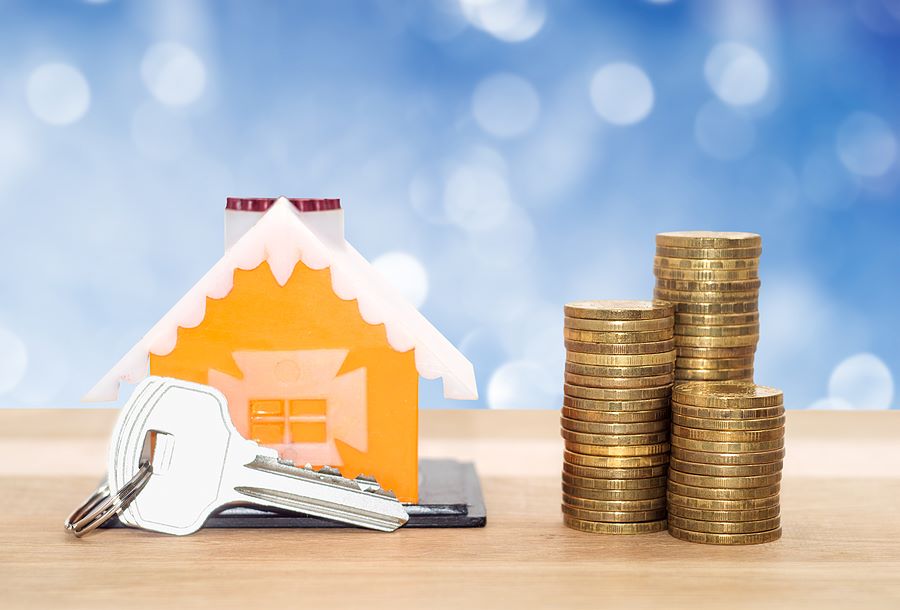There are multiple mortgage options available such as conventional, fixed-rate, adjustable-rate, government-backed and jumbo loans. The ideal loan for you depends on your status as a mortgage applicant - whether you're a first-time home buyer or considering downsizing or refinancing.
1. Conventional Mortgages
Standard mortgages are the prevalent form of mortgage. However, the requirements for the borrower's minimum credit score and debt-to-income (DTI) ratio may vary from other loan options. Usually, a minimum credit score of 620 and a DTI ratio of up to 50% are necessary to qualify for a conventional mortgage.
If you are buying a home for the first time, you can start your journey into homeownership with as little as a 3% down payment. And if this isn't your first time, don't worry, you would only need a down payment of 5%. As long as your credit score is 620 or higher, you're good to go! Plus, there's an extra perk - if you can make a down payment of 20% or more, you can skip the private mortgage insurance (PMI) purchase.
Just so you know, if your down payment is less than 20%, you might need to take care of the PMI cost. Typically, the rates for mortgage insurance are lower for conventional loans when you compare them to other types like FHA loans.
If you're a borrower looking to enjoy lower interest rates by making a significant down payment, conventional loans could be a wonderful choice for you.
Pros Of Conventional Mortgages:
Usually, the overall borrowing cost, which includes fees and interest, tends to be lower than other types of loans. Isn't that great?
For loans that are eligible, you'll be happy to know that your down payment could be as low as 3% to 5%.
Cons Of Conventional Mortgages:
If your down payment is less than 20%, you'll need to cover the cost of PMI.
It would be lovely if you could meet some requirements that may involve having a credit score of 620 or more and a reduced DTI.
Home Buyers Who Might Benefit:
Conventional loans are a really good choice for those who can manage a down payment between 3% and 5%. Also, if your FICO® Score is 620 or more, that's another thumbs up!
Typically, conventional loans tend to be more advantageous for borrowers who have a Debt-To-Income (DTI) ratio of 50% or less.
2. Fixed-Rate Mortgages
The interest rate and the principal/interest payment of a fixed-rate mortgage stay the same for the whole term of the loan. Even though the monthly payment might change a little because of changes in property tax and insurance rates, generally, fixed-rate mortgages offer a pretty stable monthly payment.
If you're lucky enough to be living in your "forever home," a fixed-rate mortgage might be a better fit for you. It offers a set interest rate, which means you'll always know exactly what your monthly mortgage payment will be. This can make budgeting and long-term planning a whole lot easier for you.
If you're living in an area where interest rates are a bit on the high side, it might be a good idea to think twice about going for fixed-rate mortgages. The thing is, once you lock in this kind of mortgage, you're pretty much stuck with that interest rate for the whole duration of your mortgage, unless you choose to refinance. If you fix the rate while it's sky-high, you could end up spending thousands of dollars extra in interest. To get a better understanding of how market interest rates trend, you might want to chat with a local real estate agent or Home Loan Expert. They can shed some light on this for you.
Pros Of Fixed-Rate Mortgages:
The payments you make towards the principal and interest each month stay the same for the entire duration of your loan, making budget planning a breeze.
The period of your mortgage can comfortably pay off your loan in full.
Cons Of Fixed-Rate Mortgages:
The rate you're going to pay will be a bit more than the initial rate you might get with an adjustable-rate mortgage.
If the rates are a bit on the higher side, you could end up paying a bit more in interest over time.
Home Buyers Who Might Benefit:
Fixed-rate loans are a great choice for buyers who like the peace of mind that comes with not having to worry about their monthly principal and interest payments changing in the future.
For those who are purchasing or refinancing their dream home, with no plans to move anytime soon, these loans can offer some great benefits.
3. Adjustable-Rate Mortgages
An adjustable-rate mortgage (ARM) is the exact inverse of a fixed-rate mortgage. These are 30-year loans, but the interest rates fluctuate based on how the market rates behave. When you opt for an ARM, you initially commit to a fixed interest period. This period usually lasts for 5, 7, or 10 years. For instance, if you choose a 5/1 ARM loan, you'll have a fixed interest rate for the initial 5 years.
Throughout this introductory period, the fixed interest rate you pay is generally lower than the rates of 30-year fixed mortgages. Once your fixed interest period concludes, your interest rate will shift according to the market interest rates. Your lender will reference a predetermined index to determine the rate changes. If the index's market rates increase, so does your rate. Conversely, if they decrease, your rate also drops.
ARMs come with rate caps that set the limit on how much your interest rate can alter in a specific period and over the duration of your loan. These rate caps shield you from suddenly skyrocketing interest rates. For example, even if interest rates keep rising annually, once your loan reaches its rate cap, your rate will stop escalating. These rate caps also work the other way, limiting how much your interest rate can decrease.
Adjustable-rate loans can be an excellent option if you plan to purchase a starter home before relocating to your permanent residence. If you don't intend to reside in your home for the entire term of the loan, you can easily benefit and save money. ARMS can be particularly advantageous if you aim to make extra payments toward your loan early on. They can provide you with extra funds to contribute towards your principal. Early payment on your loan can result in savings of thousands of dollars in the long run.
Pros Of Adjustable-Rate Mortgages:
During the welcoming phase, they offer lower interest rates.
The chance to build up some savings comes from those first lower monthly payments, which also give your budget a bit more wiggle room.
Cons Of Adjustable-Rate Mortgages:
Once your introductory period wraps up, a slight increase in the rate may gently lift your monthly payments.
Understanding your financial situation can get a bit tricky with changes in interest rates and mortgage payments.
Home Buyers Who Might Benefit:
- An ARM could be a great choice for those who are seeking a lower initial rate when buying their first home.
- If you're thinking that you might not stay in your home for the full term of the loan, an ARM could be a beneficial option for you.
4. Government-Backed Loans
Loans that have the government's backing like those insured by the friendly folks at the Federal Housing Administration (FHA), Veterans Affairs (VA) or the United States Department of Agriculture (USDA), are commonly known as government-backed loans.
The usual suspects when it comes to government-backed loans that lenders often talk about are FHA, VA and USDA loans. These loans can offer a broader array of qualification options. Each of these government-backed loans has its own unique benefits and special qualification criteria. Depending on your eligibility, these loans could help you save on interest or down payment requirements.
FHA Loans
The Federal Housing Administration is here to help with insurance for FHA loans. These wonderful loans could open the door for you to buy a house even with a credit score starting at 580, and you'd only need a minimum down payment of 3.5%! And here's even more good news: an FHA loan might let you become a homeowner with a credit score as low as 500, as long as you're able to make a down payment of at least 10%.
USDA Loans
The United States Department of Agriculture kindly provides insurance for USDA loans. These lovely loans feature fewer mortgage insurance needs than FHA loans, potentially letting you buy a house without a down payment. But, to qualify for a USDA loan, you'll need to meet certain income criteria and the house you're eyeing should be located in a USDA-approved suburban or rural area.
VA Loans
The Department of Veterans Affairs is here to support you by offering insurance for VA loans. These wonderful loans can open the door to homeownership for you, even without a down payment, and often come with lower interest rates than many other loan types. Just keep in mind, to be considered for a VA loan, you'll need to meet certain service requirements in the Armed Forces or National Guard.
Pros Of Government-Backed Loans:
- Guess what? You might have a chance to reduce your interest and down payment, which could possibly lead to lower closing costs. Isn't that great?
- Also, these types of loans might open up more opportunities for borrowers to qualify. How cool is that?
Cons Of Government-Backed Loans:
- Let's make sure you meet certain friendly requirements to join our eligible members.
- Just a heads up, some of our government-supported loans come with a small mandatory upfront insurance premium (also known as funding fees). This might slightly increase your borrowing expenses, but we're here to help you navigate through it.
Home Buyers Who Might Benefit:
- If your cash savings are a bit on the low side, a government-backed loan could be a helpful option for you.
- For folks with less-than-perfect credit ratings, a government-backed loan might be a beneficial choice.
5. Jumbo Loans
Hey there! Let's chat about jumbo loans. This is a special type of loan that goes beyond the usual loan standards where you live. It's often used when you're looking to buy a property with a higher value. For example, Rocket Mortgage can give you a jumbo loan as high as $2 million. Just to give you an idea, the usual loan limit in many parts of the country is $726,200.
Now, the interest rates for jumbo loans usually match up with the standard interest rates, but getting one can be a bit more tricky compared to other types of loans. You'll generally need a better credit score and a lower debt-to-income ratio to qualify for a jumbo loan. So, it's a good fit if you have your finances in great shape!
Pros Of Jumbo Loans:
- The interest rates they offer are comparable to those of conforming loans.
- You have the ability to take out a larger loan for a more costly property.
Cons Of Jumbo Loans:
- To be eligible for a jumbo loan, you'll typically need a credit score of 700 or above. Also, it's important to have a significant down payment or cash reserves, and a lower DTI ratio compared to other loans. Don't worry, it sounds more complicated than it is!
- Usually, you'll need to make a substantial down payment, somewhere between 10% to 20%. But remember, every penny counts towards your dream home!
Home Buyers Who Might Benefit:
- People who need a loan of more than $726,200 for their dream home usually have a strong credit history and a manageable debt-to-income ratio.
- If you have any questions about any of these different types of loans, please call our office at (717) 779-9833 for more information.



